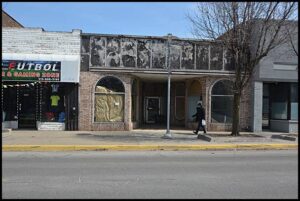City officials clear the way for a microbrewery taproom

Hamtramck’s first microbrewery cleared a hurdle with city officials and can proceed with development plans at a vacant building at 9350 Jos. Campau. The developers sought and received a tax abatement for the project.
By Charles Sercombe
For a second time, the city council has struggled with a tax abatement request for a renovation project of an old building.
Last year, the council agreed to a 10-year abatement for the former Missant facility on Conant. That abatement calls for freezing the current property tax rate for that period of time.
An online truck parts company, Zbox, will be renovating the Missant headquarters, and knocking down the dilapidated buildings on the site.
That abatement vote took several tries because the council at that time was split 3-3 on the request.
Recently, the city council faced a similar request for a building at 9350 Jos. Campau.
However, unlike the previous development and abatement request, this development is tied into a grant worth over $250,000 from the Michigan Economic Development Corporation (MEDC).
The total cost for the renovation will be $680,000.
The only catch is that, in order to qualify for the grant, the city has to make its own financial investment — in the form of a tax abatement that would, once again, lock the property’s current tax rate in for a period of years.
The building currently generates $3,650 in yearly property taxes. After the abatement, property taxes are expected to increase to over $8,000 a year.
The developer, Milo Madole, who also sits on the city’s Downtown Development Authority, told the council that “this project is impossible without this grant.”
The grant is part of a state program to help developers turn obsolete buildings into functioning ones once again.
Madole and his partner plan to turn the building into a microbrewery tap room and community meeting place.
Once completed, it would employ 15 people, and also would provide temporary work for construction and rehabilitation/remediation workers.
The building has been vacant since mid-2000, and, for several years, the city was collecting no money from taxes. The building had also been in a foreclosure process for several years.
Madole purchased the building in 2018, which is when the city once again became able to resume collecting property taxes.
Reuben Riggs-Bookman, an intern in the city’s Community and Economic Development Department, hailed the project as a “huge opportunity for the City of Hamtramck.”
He added that the project will encourage people “to come back to the city.”
Madole was seeking a12-year tax abatement.
Riggs-Bookman pointed out that, according to the city’s policy, a project with at least a $250,000 investment automatically qualifies for a 12-year abatement.
Madole said he could also get by with a 10-year abatement.
But the city council saw things differently.
Councilmember Nayeem Choudhury, who owns a business, said granting the request could put the city in a situation where “we’ll have to open the door” to future requests.
Riggs-Bookman responded that, according to state guidelines, this is not the case, because each community is limited to the number of abatements that can be made through the Obsolete Property Rehabilitation program.
Mayor Amer Ghalib stressed that the Zbox project was not given a 12-year abatement, and that that project’s investment is about $19 million (and will result in creating about 75 jobs).
The council agreed on a four-year abatement. It was not immediately clear whether that time period would qualify the project for the state grant.
The public also weighed in on the matter during a public hearing.
Andrew Kopietz supported the project, saying it will act a “multiplier” for more development.
Nasr Hussain said that, since Madole is receiving “free money,” he should be able to pay the tax rate as it goes up.
He also said that the $600,000 renovation cost is “fake numbers,” and that the project’s cost estimates for plumbing and flooring are inflated.
If the developer can’t afford to move forward without the grant, Hussain suggested, then he should sell the building to someone who can afford the renovation on their own.
Danielle Bidigave questioned how many in this Muslim-majority community will actually support the microbrewery. Those of the Muslim faith do not partake of alcohol.
Bill Meyer also questioned why the developers are creating a tap room, since 80 percent of the city’s population will not be going there, and it would therefore require having “outsiders” coming into the city to support it.
He also said that approving the abatement is “taking money from poor people” in the city.
Posted March 24, 2023

